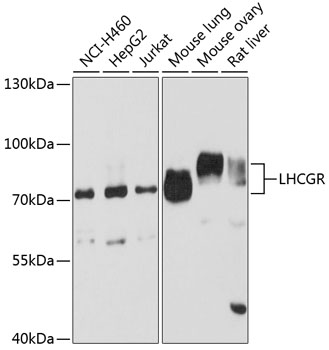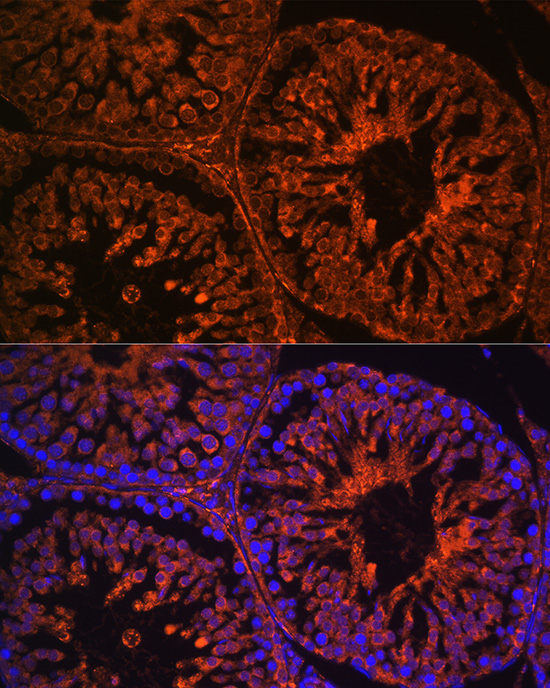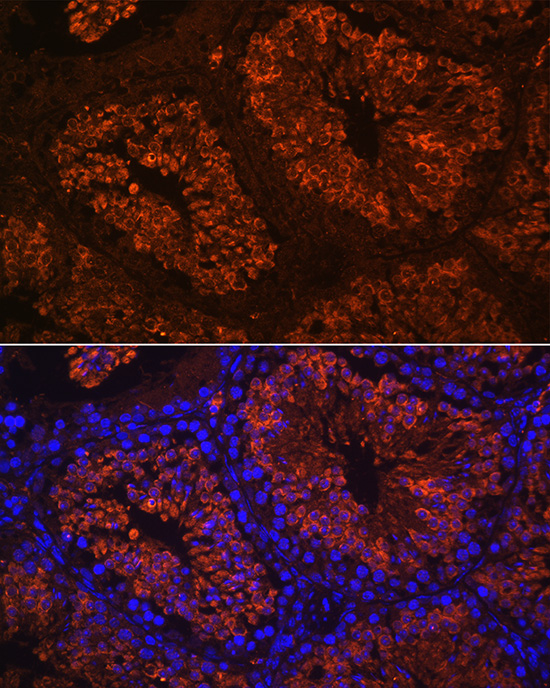Anti-LHCGR Antibody (CAB6266)
- SKU:
- CAB6266
- Product type:
- Antibody
- Reactivity:
- Human
- Reactivity:
- Mouse
- Reactivity:
- Rat
- Host Species:
- Rabbit
- Isotype:
- IgG
- Antibody Type:
- Polyclonal Antibody
- Research Area:
- Cell Biology
Description
| 抗体名: | Anti-LHCGR Antibody |
| 抗体コード: | CAB6266 |
| 抗体サイズ: | 20uL, 50uL, 100uL |
| 申し込み: | WB IF |
| 反応性: | Human, Mouse, Rat |
| 宿主種: | Rabbit |
| 免疫原: | Recombinant fusion protein containing a sequence corresponding to amino acids 200-360 of human LHCGR (NP_000224.2). |
| 申し込み: | WB IF |
| 推奨希釈: | WB 1:200 - 1:2000 IF 1:50 - 1:200 |
| 反応性: | Human, Mouse, Rat |
| ポジティブサンプル: | NCI-H460, HepG2, Jurkat, Mouse lung, Mouse ovary, Rat liver |
| 免疫原: | Recombinant fusion protein containing a sequence corresponding to amino acids 200-360 of human LHCGR (NP_000224.2). |
| 精製方法: | Affinity purification |
| ストレージバッファ: | Store at -20'C. Avoid freeze / thaw cycles. Buffer: PBS with 0.02% sodium azide, 50% glycerol, pH7.3. |
| アイソタイプ: | IgG |
| 順序: | TSLE LKEN VHLE KMHN GAFR GATG PKTL DISS TKLQ ALPS YGLE SIQR LIAT SSYS LKKL PSRE TFVN LLEA TLTY PSHC CAFR NLPT KEQN FSHS ISEN FSKQ CEST VRKV NNKT LYSS MLAE SELS GWDY EYGF CLPK TPRC APEP DAFN PCED IMGY D |
| 遺伝子ID: | 3973 |
| Uniprot: | P22888 |
| セルラーロケーション: | Cell membrane, Multi-pass membrane protein |
| 計算された分子量: | 71kDa/78kDa |
| 観察された分子量: | 70-78kDa |
| 同義語: | LHCGR, HHG, LCGR, LGR2, LH/CG-R, LH/CGR, LHR, LHRHR, LSH-R, ULG5 |
| バックグラウンド: | This gene encodes the receptor for both luteinizing hormone and choriogonadotropin. This receptor belongs to the G-protein coupled receptor 1 family, and its activity is mediated by G proteins which activate adenylate cyclase. Mutations in this gene result in disorders of male secondary sexual character development, including familial male precocious puberty, also known as testotoxicosis, hypogonadotropic hypogonadism, Leydig cell adenoma with precocious puberty, and male pseudohermaphtoditism with Leydig cell hypoplasia. |
| UniProt Protein Function: | LHR: Receptor for lutropin-choriogonadotropic hormone. The activity of this receptor is mediated by G proteins which activate adenylate cyclase. Defects in LHCGR are a cause of familial male precocious puberty (FMPP); also known as testotoxicosis. In FMPP the receptor is constitutively activated. Defects in LHCGR are the cause of luteinizing hormone resistance (LHR); also known as Leydig cell hypoplasia in males. LHR is an autosomal recessive disorder characterized by unresponsiveness to luteinizing hormone, defective sexual development in males, and defective follicular development and ovulation, amenorrhea and infertility in females. Two forms of the disorder have been defined in males. Type 1 is a severe form characterized by complete 46,XY male pseudohermaphroditism, low testosterone and high luteinizing hormone levels, total lack of responsiveness to luteinizing and chorionic gonadotropin hormones, lack of breast development, and absent development of secondary male sex characteristics. Type 2, a milder form, displays a broader range of phenotypic expression ranging from micropenis to severe hypospadias. Belongs to the G-protein coupled receptor 1 family. FSH/LSH/TSH subfamily. 2 isoforms of the human protein are produced by alternative splicing. |
| UniProt Protein Details: | Protein type:Membrane protein, integral; Receptor, GPCR; GPCR, family 1; Membrane protein, multi-pass Chromosomal Location of Human Ortholog: 2p21 Cellular Component: integral to plasma membrane; plasma membrane; endosome Molecular Function:lutropin-choriogonadotropic hormone receptor activity Biological Process: G-protein coupled receptor protein signaling pathway; G-protein signaling, coupled to cyclic nucleotide second messenger; male gonad development; adenylate cyclase activation; male genitalia development; G-protein signaling, coupled to IP3 second messenger (phospholipase C activating); positive regulation of inositol trisphosphate biosynthetic process; luteinizing hormone signaling pathway; cognition Disease: Precocious Puberty, Male-limited; Leydig Cell Hypoplasia, Type I |
| NCBI Summary: | This gene encodes the receptor for both luteinizing hormone and choriogonadotropin. This receptor belongs to the G-protein coupled receptor 1 family, and its activity is mediated by G proteins which activate adenylate cyclase. Mutations in this gene result in disorders of male secondary sexual character development, including familial male precocious puberty, also known as testotoxicosis, hypogonadotropic hypogonadism, Leydig cell adenoma with precocious puberty, and male pseudohermaphtoditism with Leydig cell hypoplasia. [provided by RefSeq, Jul 2008] |
| UniProt Code: | P22888 |
| NCBI GenInfo Identifier: | 281185513 |
| NCBI Gene ID: | 3973 |
| NCBI Accession: | P22888.4 |
| UniProt Secondary Accession: | P22888,Q14751, Q15996, Q9UEW9, |
| UniProt Related Accession: | P22888 |
| Molecular Weight: | 71,615 Da |
| NCBI Full Name: | Lutropin-choriogonadotropic hormone receptor |
| NCBI Synonym Full Names: | luteinizing hormone/choriogonadotropin receptor |
| NCBI Official Symbol: | LHCGR |
| NCBI Official Synonym Symbols: | HHG; LHR; LCGR; LGR2; ULG5; LHRHR; LSH-R; LH/CGR; LH/CG-R |
| NCBI Protein Information: | lutropin-choriogonadotropic hormone receptor; hypergonadotropic hypogonadism; lutropin/choriogonadotropin receptor |
| UniProt Protein Name: | Lutropin-choriogonadotropic hormone receptor |
| UniProt Synonym Protein Names: | Luteinizing hormone receptor; LHR; LSH-R |
| Protein Family: | Lutropin-choriogonadotropic hormone receptor |
| UniProt Gene Name: | LHCGR |
| UniProt Entry Name: | LSHR_HUMAN |




